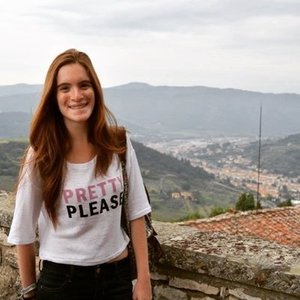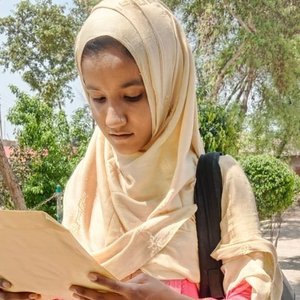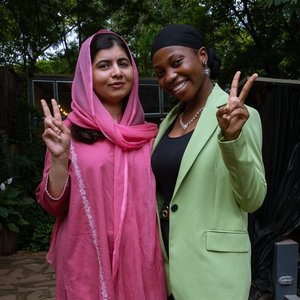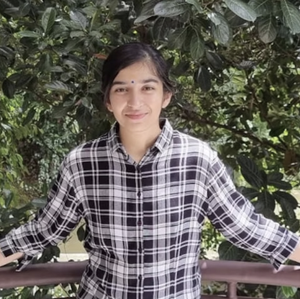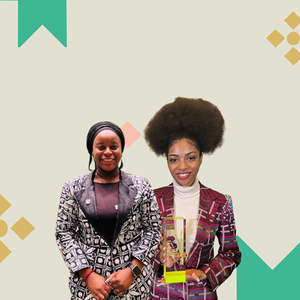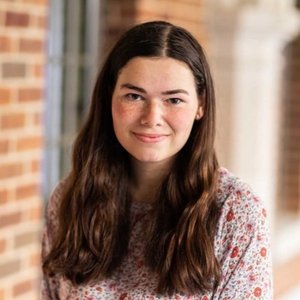Displaced by Colombia’s civil war, María Ceballos Paz fights against racism and poverty to reclaim her future
When María Ceballos Paz thinks of her home in southwestern Colombia, she thinks of the sound of the sea and the smell of fruit on her family’s farm. But María hasn’t been home in 20 years — she is one of 7.3 million people displaced by Colombia’s civil war. For half a century, the conflict between the army, paramilitary, guerrilla groups and drug cartels forced families like María’s from their homes.
María first fled after guerrilla fighters killed her father over a land dispute with a neighbour. With her mom and siblings, she lived in tents made of plastic and wood — at one point, María shared two small bathrooms with 750 other people in an informal settlement. Discriminated against for their darker skin and rural accents, María and her family face difficulties wherever they move. María tells her story in Malala Yousafzai's upcoming book “We Are Displaced,” which hits shelves on January 8, 2019.
Ahead of the book’s release, I spoke with María about her memories of home, the challenges of being displaced and what she hopes the government will do to support displaced people like her.
María Rendo (MR:) Tell me what you remember about your family’s home in Iscuandé, Nariño, Colombia.
María Ceballos Paz (MCP): It smelled like sand and a mix of the fruits that were there in my house. You could hear the sound of the sea, because my house was very close to the river and the sound of the boats passing through. You could hear all the noise the kids made when they would go to bathe in the river.
MR: You were only 4 years old when your family was forced to leave from your home to flee north to the city of Cali. Do you remember the ten-hour boat ride? How did you feel that night?
MCP: I felt normal because, at the time, I didn’t know what was happening. I was just a bit unsettled because the boat was moving a lot so all the movement wasn’t letting me sleep well. But at the time, I didn’t really know why we were leaving so everything else felt normal.
MR: In your chapter in Malala’s book, you talk about how you and your family were discriminated against in Cali for your darker skin and rural accents. How did the locals treat you differently?
MCP: They tried to make me feel bad for the way I spoke and they made fun of my family, because we had a very thick accent. At school, they would bully me because of how I spoke and because my skin was much darker. There was always that discrimination and that’s why I would isolate myself from people. I couldn’t talk because I was afraid they’d make fun of the way I spoke.
They also discriminated against my mom so I felt like if they did that to both of us, I couldn’t feel safe. There were kids who would play with me, but they would make comments like, “Look, María talks all weird.” I’d cry and isolate myself. I’d make sure to be alone as much as possible and to not talk a lot so others wouldn’t make fun of me.
MR: I know that you’ve moved eight times since then. What were some of the reasons you and your family moved around?
MCP: We moved many times. First, we couldn’t pay for rent so we got kicked out. Then when we were renting a small house, the neighbours started making fun of my mom because of her skin colour and her accent. So my mom decided we should move somewhere else. Before arriving to the informal settlement (la invasión), we went to a land plot and they threw gas at us so we had to leave. We kept trying to find a house where we could pay for rent but nowhere was safe. So we kept moving until we made it to the refugee camp.
“We don’t have the possibility of saying, “Enough, I’m not displaced anymore and I want to start a new life.” We will always be labelled as displaced and that closes all the doors for me.”
MR: What is the most challenging part of moving to a new place?
MCP: The most challenging part about moving is arriving to a new place — especially when I was a little girl — was making friends. I’d feel like they were going to make fun of me because of my accent or because I am black, so it was hard to adapt to that place. Arriving and having people give us ugly stares, the truth is that it was really hard. That was really hard to be discriminated because of your accent or your skin colour. When people don’t like you and they start making your life impossible to force you to leave, that’s the hardest part.
MR: How long have you been living where you are now? Are you starting to feel at home?
MCP: We’ve been living where we are now for three years but no, the truth is that I haven’t felt at home anywhere. I don’t feel at home because people are rude to us. My family talks loudly because we come from a place where people are loud so that has stuck with us as a habit. And sometimes people don’t like that. So I don’t feel at home. I don’t feel like I’m there yet.
MR: Do you still want to study communications or social work at university? What is keeping you from continuing your education?
MCP: I can’t study social communication, which is what I’m passionate about, because I can’t pay to attend university. Here that major is very expensive so if you don’t have the money to pay for it, sadly you can’t study.
MR: You were working at a beauty salon until recently. Why did you have to leave that job?
MCP: Yes, I worked at a beauty salon, but I quit because it paid very little. The owner didn’t care about the employees, she only cared about them making money for her. It was exhausting. I quit because she didn’t pay us what she should’ve paid us. I had to pay for rent, food and my younger brother’s school and expenses. The money wasn’t enough to pay for my transportation to work or anything. There was also the way she treated me. “Work negrita work,” she’d say. Even though people say that racism is over, the truth is that it’s still there. That’s why I left that job.
MR: What do you like to do for fun?
MCP: I like reading and writing about what’s happening to me. I like writing what I feel. It really helps me get things off my chest. Sometimes I feel frustrated because I can’t pay for rent or I can’t eat lunch, so I sit down to write or read. That’s my free time: reading and writing.
MR: How does it feel to look back at the documentary you created, “Displaced But Not Defeated”? Has your message about displaced persons changed?
MCP: I feel very happy because people are realising what is really happening here in Colombia about displacement. There is no support, so it’s great for people to know what the situation is. That was the idea: to deliver the message and get people to understand that this is very hard. There is a big difference between talking about it and living it. I went through so many difficult things and I see that other people are going through them too. I feel very happy to have people watch it and realise that displaced people are suffering and living in hard conditions.
MR: What do you think the government can do to help internally displaced families?
MCP: I sincerely think that the government of Colombia — even though it says that they are taking action and they are helping — they‘re really not helping because there are too many displaced people, there are too many people suffering. They say they are helping with health and education but if you go to the “Entidades Promotoras de Salud” [Colombia’s public health system], there is a huge line to get an appointment to come back three or four days later. I don’t want to speak badly of the government of Colombia, but they still have a long way to go to help these people. When someone is in this situation, they need a lot of help with food, etc. and the government isn’t doing enough.
MR: After people read your story in Malala’s book, what do you hope they will learn? What do you hope they will do?
MCP: I hope that people learn. I hope that they see how displaced people live and put themselves in their shoes. I also hope they learn that there are children who have many dreams, but because we don’t have money or because we don’t belong to a certain social class, we can’t achieve those dreams. I want people who read my story to know that this is something that is happening in many countries and all over Colombia. I hope people see that despite many obstacles, there are children who are still dreaming and are still present. I hope people truly know that the government isn’t doing anything and that displacement is hard.
We don’t have the possibility of saying, “Enough, I’m not displaced anymore and I want to start a new life.” We will always be labelled as displaced and that closes all the doors for me. I want people to know that there is a young woman here who still has many dreams to fulfil. And no matter how many obstacles come across, she will keep dreaming and persevering to reach her goals.
This interview has been edited and condensed for clarity.
 Read more
Read more






